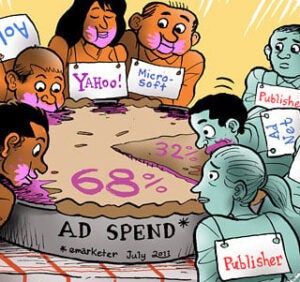 “Data-Driven Thinking” is written by members of the media community and contains fresh ideas on the digital revolution in media.
“Data-Driven Thinking” is written by members of the media community and contains fresh ideas on the digital revolution in media.
Today’s column is written by Matt Brummett, chief operating officer at Answer Media.
Don’t worry. This isn’t yet another pile-on piece about the unfair walled-garden tactics of the major digital advertising players. There has been no shortage of viewpoints, published articles and even attack campaigns about how the big guys, namely Google and Facebook, have taken the industry hostage by not allowing brands and publishers to integrate their first-party data. They don’t allow third-party companies and technology inside their walls, either.
There are more complaints but I won’t regurgitate the frustrations of so many on this topic. Instead I’ll focus on solutions to work around the walled gardens. From where I stand, the solution lies first and foremost with advertisers and agencies. It’s easy for them to complain about walled gardens and platforms but it’s ultimately their addiction to taking the path of least resistance, including their thirst for scale over quality. This side effect from the programmatic revolution exacerbates the impact of the walled gardens.
Advertisers need to start looking past the walled gardens to a more back-to-the-basics approach for their media strategy and investment. This is not meant as a call to abandon their programmatic investments. Programmatic has become too much of a digital advertising cornerstone that marketers can’t afford to marginalize, much less ignore. But striking a more discerning approach to a more balanced advertising mix will help mitigate some of the impact from the walled gardens.
Instead, advertisers and agencies continue to insist on paying lower and lower CPMs through the open exchanges while simultaneously demanding higher-quality inventory. It’s darn near impossible to have both, especially solely through programmatic exchanges. It’s a situation that has perpetuated fraud and other issues plaguing the industry today. So much focus is on scale that fraudulent impressions keep getting bought to fulfill budgets, which incentivizes those who profit from it.
Advertisers need to think about placing greater priority and effort to cultivating direct relationships with the publishers whose audience they covet and it needs to be a directive drilled down to their agencies and the buyers within the agencies responsible for spending the advertiser’s budget. Private exchange deals, direct integrations via OpenRTB, high-impact placements and back-to-basic direct buys provide the most benefit to the ecosystem as a whole, in terms of high-quality, mutually beneficial value exchanges among advertisers, publishers and consumers. Advertisers aren’t saddled with the risks of fraud and transparency, publishers are properly compensated for their audiences and many unnecessary middle layers can be removed. The user also benefits by seeing fewer ads, as well as ads that are more meaningful and relevant.
There can be an approach that combines both the efficiency of programmatic with the quality of direct, while moving the industry away from sole dependence on walled gardens. It will take both willingness and work. Ultimately, the onus is on advertisers to be more accountable and take control of the direction of their digital media budgets.
Follow Answer Media (@videomosh) and AdExchanger (@adexchanger) on Twitter.












